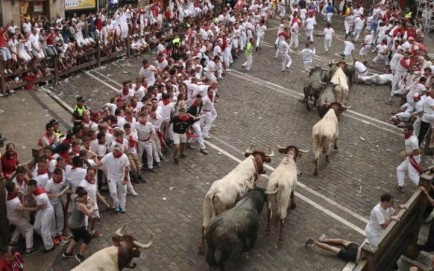
This year’s bull run in Pamplona has garnered as much global media attention as it always does.
It is that time of year again. Shaky videos of panicked men – it’s usually men – running inelegantly down tight narrow streets being not so much chased but bemusedly pursued by large bulls flood the internet…
Yep, in case you hadn’t heard, the Running of the Bulls festival in Pamplona is back with us for another summer. And returning too are the reams of articles denouncing this practice, accompanied by news reports keeping a bloody tally.
In 2017, it’s so far, so good on that front: just a handful of injuries and a smattering of gorings, whereas last year saw 12 people severely gored.
The fascination the world holds for this ancient festival is understandable, but what is more interesting is to analyse what this festival – and the attention it receives – reveals about Spain…
- Tradition never dies…
Be it flamenco dancing, bull fighting, bull running, the siesta or even those strange human pyramids that stagger into view every year, but Spain’s cultural traditions do not only appear to persist year on year, but in today’s social media-driven world, their popularity actually seems to be on the rise.
Bull fighting will of course always draw controversy, but even some of its harshest critics concede that it is a strong marker of Spanish cultural identity – an identity that is perhaps more distinctive than almost any other in the world.
- … and foreigners love it
The rollcall of those injured at the Pamplona bull run features every year without fail at least a handful of Americans, a couple of Brits, one or two Australians and usually some Italians or French.
Spain’s insistence of maintaining its traditions – even in the stern face of ‘health and safety’ – speaks to something tribal within those who live in countries that could be classed as Nanny States. No way would a bull run or a tomato fight be sanctioned in the UK, for example, and it is this sense of “anything goes” about Spain that appeals to many, many tourists.
- The world shows its respect
In many countries that boast cultural traditions that are alien to everywhere else, the best response that nation can hope to receive is either to be ignored or lightly admonished.
Not in Spain. Most of the world’s press descends upon Semana Santa, La Tomatina and the Pamplona bull run every year precisely because they are full of fascination and respect for a country that not only has such distinct regional identities, but also a fierce and sustainable urge to protect and nurture them. That is almost unique on the world stage in this day and age.
 en
en



 Vlaams-Nederlands
Vlaams-Nederlands
0 Comments
Leave a Comment
DISCLAIMER
The opinions and comments expressed by contributors to this Blog are theirs alone and do not necessarily reflect the views of VIVA Homes Under the Sun Ltd, any of its associated companies, or employees; nor is VIVA to be held responsible or accountable for the accuracy of any of the information supplied.
Have you got something to say?